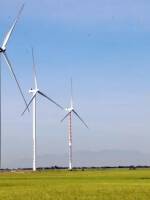
A few months ago, I read some news on Helene and Milton hurricanes being supercharged by climate change that hit hard on the U.S. Closer to home, typhoon Yagi wreaked havoc disrupting normal life in many Southeast Asian countries.
It was a shock to see how a warming planet can make storms so much more powerful and destructive. It reminds us once again that climate change is right here, and it impacts all of us worldwide.
Fortunately, sustainability is gaining more focus globally. Coupled with the latest report from Intergovernmental Panel on Climate Change that highlighted the cost of inaction, there is an increasing push on companies to adopt sustainable practices today.
Stakeholder pressure including investors, customers, employees, and regulators is further driving this change. As a result, we are seeing more companies adopt net zero commitments as part of their environmental as well as broader ESG policies.
In Vietnam, 40% of local businesses have planned for and set themselves ESG commitments, according to a study by PwC. In a recent survey conducted by the Vietnamese Government’s Private Economic Development Research Board, 48.7% of businesses mentioned that net zero transition was critical to them.
The toughest nut to crack
Large global companies are already incorporating ESG considerations into their operations. For instance, HSBC aims to achieve net zero in our operations and supply chain by 2030 and in our financing portfolio by 2050. Not stopping there, this approach is increasingly being adopted further down the supply chain.
As corporates are actively looking at ways to improve their green performance, most of them will increasingly scrutinize their supply chains. The reason is simple. For most organizations, the environmental impact within their supply chain significantly outstrips the impact related to their own operations. On average, supply chain accounts for more than 90% of an enterprise’s greenhouse gas emissions.
The so-called Scope 3 emissions, generated by companies’ suppliers, is the toughest nut to crack for many corporates committed to reducing their carbon footprint. That said, their efforts are encouraging. According to a study by EY, 78% of companies are developing programs and initiatives around sustainable supply chains with key partners, showcasing strong ambition for making the change. In DMCC’s Future of Trade survey, most respondents (59%) expected firms to remove poor ESG performers from their supply chains.
Sustainability is also a rapidly growing priority that has become central to how corporates in Asia are planning to govern their supply chains and respond to customer expectations. The findings of HSBC’s Asia Supply Chains – A New Era report show that firms are not only developing green policies, but also investing in the implementation of sustainable practices across their network.
Removing the barriers
While there is a clear uptick in corporates adopting environmental and social policies for their supply chains, greening entire supply chains is challenging, given the lack of relevant data and transparency.
In the long term, the push for greener supply chains will lead to a rerouting of trade whereby businesses will not only seek out the most cost-effective supplies but will also demand more data on environmentally friendly producers.
Suppliers in many parts of the world face challenges to improve their sustainability performance, including the lack of access to finance, incentives, and knowledge. Delivering Net Zero Supply Chains, a recent research from HSBC and Boston Consulting Group (BCG), highlighted that SME businesses don’t have the in-house climate expertise and have limited access to capital to drive and fund climate transformation.
In particular, the costs of this transition can be significant particularly for small scale factories in developing markets, and corporates also must consider the differing regulatory environments across their supplier markets.
The report identified the need for a ‘leadership crucible’ where large corporates can provide liquidity and share knowledge and resources with smaller businesses. This is where global banks can play a role in helping decarbonize cross-border trade flows and supply chains.
HSBC, for example, works with corporates to support them in meeting their longer-term, enterprise-wide environmental and social targets. Our strategic propositions, including sustainable supply chain financing solution, has significant potential to help companies reduce their Scope 3 emissions and to cascade climate action through their supply chains.
This solution can help our clients’ suppliers access working capital – usually in the form of early payment terms or tiered interest rates that consider the suppliers’ sustainability performance – which can be used to support emissions reduction and wider sustainability improvements.
With this financial solution, SME businesses who are under large corporates’ supply chains will have better access to the bank’s working capital at lower interest rates compared to their own borrowings.
In 2019, HSBC supported US retail giant Walmart to create an industry first supply chain finance program which not only enables greenhouse gas emission reductions but also uses science-based targets to do so in a way that aims for a 1.5°C pathway.
The program introduced enhanced standards, tools and capacity building to help Walmart’s private brand suppliers upskill. In turn, they aligned their operations with transparent sustainability objectives and can access better pricing than available in traditional supply chain financing offerings.
Those who adopt science-based targets and international reporting standards, increase level of suppliers in Climate Disclosure Program (CDP), and demonstrate progress in their sustainability credentials will be incentivized with access to improved financing from HSBC.
HSBC has developed this proposition globally including Asia Pacific, Europe, USA, and Middle East with successfully implementing many programs for our clients in different industries, ranging from retail, footwear, textile and garments etc.
In markets like Vietnam, we see significant opportunities in sustainable supply chain finance services given a strong interest among clients in fast moving consumer goods, logistics, and so on.
In conclusion, sustainability has rapidly become a core consideration in today’s corporate supply chain discussion, driven largely by consumers and investors looking for more ethical manufacturing practices from the companies they buy from and invest in. The conversation will continue to evolve and have an impact on supply chain strategy globally. The finance sector will certainly have a role to play in supporting corporates in driving their sustainability agenda enterprise wide.
Surajit Rakshit




